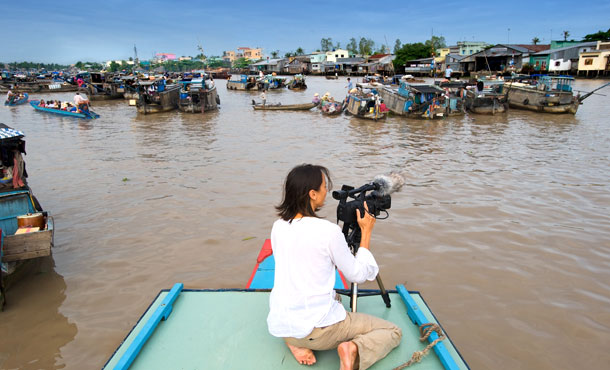Backstory - Journey along the Mekong
Using public buses and ferry boats, I spent a month travelling from northern Laos south through Cambodia to the Mekong Delta in Vietnam. Public transport was wonderful for meeting local people and hearing their stories. It was terrible for filming though. On a fifteen-hour bus journey, we might stop three times: twice for a quick toilet break and once for a roadside bowl of noodles. Often the stops happened after dark. That meant I rarely had an opportunity to pull out my camera. I welcomed breaking down, which fortunately was not uncommon.
My visit coincided with the rainy season which meant spending my days dodging showers, and most of my evenings trying to dry camera equipment, notebooks and clothes.
I only got into trouble once with the authorities. At the border between Laos and Cambodia, the crossing was a few hundred metres of no-man’s-land: a desolate stretch of open road between military posts and surrounded by rainforest. Of course, it was not the ideal place to pull a large commercial camera out of a backpack but the shot was too good not to try at least to have a go. I managed to put up the tripod and click the camera into place but further effort was swiftly halted. I lost the tape to a smiling Cambodian police chief. At the risk of getting deported for cheekiness, I gently argued I was breaking no one’s law since I was in no-man’s land. He continued smiling but wouldn’t shift his position. There was nothing to do but smile back and pack up my gear. In spite of the size of my camera, he accepted that I was a backpacker with a keen passion for home-video-making. By the end of our conversation, he sweetly offered me a lift to Phnom Penh.
My month on the Mekong was wonderful and very, very wet. It also wakened me to the changes, particularly in Laos, since my last visit there in the mid-90s: the strong influence of Chinese and Thai culture on its neighbours; the rise in prosperity for town-dwellers and the stagnancy in education levels among rural communities; the increase in traffic, in spending and in noise.
Back to my tapes: editing almost always improves work. I do not mind seeing weeks of work and hours of footage condensed to a few minutes. I just hope the report is rich enough to capture the spirit of this great river and the people who live on its banks.





